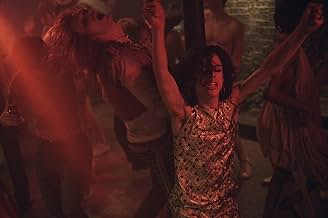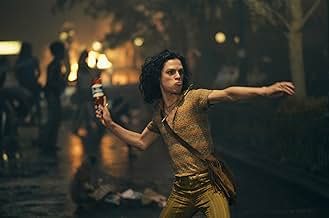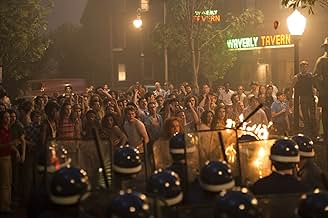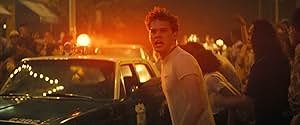CALIFICACIÓN DE IMDb
5.4/10
4.6 k
TU CALIFICACIÓN
Sobre el despertar político y la oportunidad de crecimiento que experimenta un joven en los días anteriores a los disturbios de Stonewall.Sobre el despertar político y la oportunidad de crecimiento que experimenta un joven en los días anteriores a los disturbios de Stonewall.Sobre el despertar político y la oportunidad de crecimiento que experimenta un joven en los días anteriores a los disturbios de Stonewall.
- Premios
- 4 nominaciones en total
Vlad Alexis
- Cong
- (as Vladimir Alexis)
- Dirección
- Guionista
- Todo el elenco y el equipo
- Producción, taquilla y más en IMDbPro
Opiniones destacadas
Roland Emmerich's biggest mistake was calling the movie "Stonewall" and marketing it as if it were the actual story of the rebellion. It gave people the wrong expectation. It's not a movie about Stonewall. It's a movie about a Midwestern gay man whose story takes place on Christopher street at the time of the riots. It's also in part the story of the first person he meets in New York, played by Jonny Beauchamp, who steals the movie. It's basically a very oddball romance and coming-out story. People wanted an accurate historical epic about the importance of the riots, and the movie isn't that and was never meant to be.
For what it really is, it's a very good movie. Like most "historical" movies there are inaccuracies. The worst distortion is giving Danny the "first brick." That's upset a lot of people, but in the dramatic structure of the movie it's as much about Danny's becoming himself--a gay man throwing away his shame--as it is about the situation he finds himself in. The police are depicted as "bad" in the black-and-white morality of an old-fashioned hero-versus-villain Saturday morning serial. But beyond those inaccuracies and the impossibility of recreating Christopher Street as it was (which seems to be especially upsetting to some New York viewers), the movie is as faithful to its surrounding event as any Shakespeare history play to its, including sympathetic depictions of a very diverse neighborhood of LGBT types.
As a long-time gay activist, I liked the movie a great deal. It feels real as I remember things to have been 46 years ago. I felt a genuine emotional rush during and after the riot. The movie ends with typical historical clean-ups, telling us what became of the real people, like Marsha P Johnson and others who appear in the movie, and mentioning the additional nights of rioting and how they went on to be regarded in LGBT history.
For me the saddest thing about this film is the divisions it's exposed among various components of the LGBT community. This history belongs to all of us, black, brown, white, gay, lesbian, transgender, drag queen, troll, twink, and so on; if we can't honor it in all of our variations, no one else will either. Go to see it as a good story well told, not as a factual documentary. I write this knowing some of you won't be able to, some of you won't want to, and some of you won't believe me. I wish there were something I could do about that, but there isn't.
For what it really is, it's a very good movie. Like most "historical" movies there are inaccuracies. The worst distortion is giving Danny the "first brick." That's upset a lot of people, but in the dramatic structure of the movie it's as much about Danny's becoming himself--a gay man throwing away his shame--as it is about the situation he finds himself in. The police are depicted as "bad" in the black-and-white morality of an old-fashioned hero-versus-villain Saturday morning serial. But beyond those inaccuracies and the impossibility of recreating Christopher Street as it was (which seems to be especially upsetting to some New York viewers), the movie is as faithful to its surrounding event as any Shakespeare history play to its, including sympathetic depictions of a very diverse neighborhood of LGBT types.
As a long-time gay activist, I liked the movie a great deal. It feels real as I remember things to have been 46 years ago. I felt a genuine emotional rush during and after the riot. The movie ends with typical historical clean-ups, telling us what became of the real people, like Marsha P Johnson and others who appear in the movie, and mentioning the additional nights of rioting and how they went on to be regarded in LGBT history.
For me the saddest thing about this film is the divisions it's exposed among various components of the LGBT community. This history belongs to all of us, black, brown, white, gay, lesbian, transgender, drag queen, troll, twink, and so on; if we can't honor it in all of our variations, no one else will either. Go to see it as a good story well told, not as a factual documentary. I write this knowing some of you won't be able to, some of you won't want to, and some of you won't believe me. I wish there were something I could do about that, but there isn't.
There's so much wrong with this movie it's hard to know where to begin.
If you want to learn about Stonewall, there are plenty of documentaries out there that tell the story much more accurately than this does: this flick plays into the tired old cliches about how the riot started, but manages to whitewash the characters and distort events horribly. You'd be better off watching "The Death and Life of Marsha P. Johnson" for starters.
If you just want a well-acted, well-written period drama, there are countless other films with better acting, better character development and less cliched writing than this one. What's particularly offensive is the reliance once again on stereotypical caricatures of fat, ugly old lecherous queens, preying upon the purebred white-boy central character. Other characters (Ray being the prime example) are completely undeveloped and could have made things more interesting. And lastly, you'd be offended if you watch this after seeing the 1995 "Stonewall" to see how much Roland Emmerich simply rips off from THAT film.
Joey King as the little sister provides some momentary relief...but like a lot of missed opportunities, there's not nearly enough of her, either.
As an old-car lover, the frequent presence of 1966 Plymouths and other gorgeous 60s cars was one of the few things that saved this from being a complete disaster.
If you want to learn about Stonewall, there are plenty of documentaries out there that tell the story much more accurately than this does: this flick plays into the tired old cliches about how the riot started, but manages to whitewash the characters and distort events horribly. You'd be better off watching "The Death and Life of Marsha P. Johnson" for starters.
If you just want a well-acted, well-written period drama, there are countless other films with better acting, better character development and less cliched writing than this one. What's particularly offensive is the reliance once again on stereotypical caricatures of fat, ugly old lecherous queens, preying upon the purebred white-boy central character. Other characters (Ray being the prime example) are completely undeveloped and could have made things more interesting. And lastly, you'd be offended if you watch this after seeing the 1995 "Stonewall" to see how much Roland Emmerich simply rips off from THAT film.
Joey King as the little sister provides some momentary relief...but like a lot of missed opportunities, there's not nearly enough of her, either.
As an old-car lover, the frequent presence of 1966 Plymouths and other gorgeous 60s cars was one of the few things that saved this from being a complete disaster.
Gay themed films are n abundance right now and (lesbian couples, transgender stories, more gay characters in many films) so it seems only natural that yet another film be made about the beginning of gay rights in the US. STONEWALL does that and despite the emphasis on political corruption attempting to steal the thunder from the brave gays who initiated the change to Gay Pride it works for the most part.
Many viewers will avoid the film because of the depiction of gays as being homeless, feminine street hustlers – too much so that it becomes a distraction form the other aspects of the story – but at least the message and the dates and the history are there. The plot revolves around the 1969 Stonewall Riots, the violent clash that kicked off the gay rights movement in New York City. The drama centers on Danny Winters (Jeremy Irvine), who flees to New York after an aborted coming out with Joe (Karl Glusman) and being ousted by his homophobic father (David Cubitt), leaving behind his sister Phoebe (Joey King). He finds his way to the Stonewall Inn, where he meets Trevor (Jonathan Rhys Meyers) before catching the eye of Ed Murphy (Ron Perlman), manager of the Stonewall who colludes with corrupt police and exploits homeless youth. Danny becomes close to a group of Nellie hustlers – especially Ray (Jonny Beauchamp) – and it is his association with this gay element that he eventually joins and fights for gay rights.
The cast is strong, the script by Jon Robin Baitz is less than impressive, but director Roland Emmerich manages to make the blend of history and human tragedy credible. Not a great movie, but the intentions are worthy.
Many viewers will avoid the film because of the depiction of gays as being homeless, feminine street hustlers – too much so that it becomes a distraction form the other aspects of the story – but at least the message and the dates and the history are there. The plot revolves around the 1969 Stonewall Riots, the violent clash that kicked off the gay rights movement in New York City. The drama centers on Danny Winters (Jeremy Irvine), who flees to New York after an aborted coming out with Joe (Karl Glusman) and being ousted by his homophobic father (David Cubitt), leaving behind his sister Phoebe (Joey King). He finds his way to the Stonewall Inn, where he meets Trevor (Jonathan Rhys Meyers) before catching the eye of Ed Murphy (Ron Perlman), manager of the Stonewall who colludes with corrupt police and exploits homeless youth. Danny becomes close to a group of Nellie hustlers – especially Ray (Jonny Beauchamp) – and it is his association with this gay element that he eventually joins and fights for gay rights.
The cast is strong, the script by Jon Robin Baitz is less than impressive, but director Roland Emmerich manages to make the blend of history and human tragedy credible. Not a great movie, but the intentions are worthy.
The film is derivative, as well as whitewashed.
There are so many factual goofs, when it comes to clothes, music, etc. The filmmaker needed to spend some time doing research and fact checking.
I also find fault with the film centering around a kid from Kansas. The uprising was started by Puerto Rican and African American drag queens, and there is strong support that the first police resistance was by a lesbian, not some white football player from the mid-west.
I suggest watching the British 1997 film, which really feels so much more authentic.
There are so many factual goofs, when it comes to clothes, music, etc. The filmmaker needed to spend some time doing research and fact checking.
I also find fault with the film centering around a kid from Kansas. The uprising was started by Puerto Rican and African American drag queens, and there is strong support that the first police resistance was by a lesbian, not some white football player from the mid-west.
I suggest watching the British 1997 film, which really feels so much more authentic.
I watched Stonewall last night and did not find it to be the horrible film I expected. It was not a great film either, a solid 6 out of ten. It was visually interesting, the dialog was a bit awkward and a little boring but IMO it accurately portrayed the feeling of 1969/70. Most of the characters were poor LGBT runaways living on the streets who were POC, transgender, dykes/lesbians and a variety of ethnicities. All the cops were white, mostly portrayed as assholes. Was the movie flawed? Absolutely. Perhaps the biggest flaw was calling the film Stonewall. Still I think it is worth seeing. If you can get past expectations of it being a historically correct documentary and watch it as a coming of age/out story about a young man from the country running to the city (which many did), at the end you can get a real reminder why we celebrate LGBT Pride today.
¿Sabías que…?
- TriviaThe Stonewall Inn or sometimes referred as Bonnie's Stonewall Inn was originally built as stables in the mid 19th century. By 1930 it became a Tearoom for heterosexuals. The Stonewall Inn first closed in 1964 after 34 year's of business as a Tearoom when the interior was destroyed by fire. It was restored by three mobsters in 1967 as a gay bathhouse and became the largest gay bar in the US. After the riots in 1969 it shortly closed. For twenty years the Stonewall ran as a Bagel Sandwich Shop, a Chinese Restaurant and shoe store before reopening in 1998 as simply Stonewall.
- ErroresThe timing of Danny's arrival in New York is confused. He leaves Indiana during the fall (it's football season, and the World Series is about to start). But his bus arrives in New York in March (3 months before the Stonewall riots).
- ConexionesFeatured in Disclosure: Ser trans más allá de la pantalla (2020)
- Bandas sonorasI Say A Little Prayer
Written by Hal David & Burt Bacharach
Performed by Stingray Music
Courtesy of Stingray Music c/o Covered Records, Inc.
Selecciones populares
Inicia sesión para calificar y agrega a la lista de videos para obtener recomendaciones personalizadas
Everything New on HBO Max in August
Everything New on HBO Max in August
Looking for something different to add to your Watchlist? Take a peek at what movies and TV shows are coming to HBO Max this month.
- How long is Stonewall?Con tecnología de Alexa
Detalles
- Fecha de lanzamiento
- País de origen
- Sitios oficiales
- Idioma
- También se conoce como
- 石牆風暴
- Locaciones de filmación
- Montreal, Quebec, Canadá(as New York City)
- Productora
- Ver más créditos de la compañía en IMDbPro
Taquilla
- Presupuesto
- USD 13,500,000 (estimado)
- Total en EE. UU. y Canadá
- USD 187,674
- Fin de semana de estreno en EE. UU. y Canadá
- USD 112,834
- 27 sep 2015
- Total a nivel mundial
- USD 292,669
- Tiempo de ejecución2 horas 9 minutos
- Color
- Mezcla de sonido
- Relación de aspecto
- 2.35 : 1
Contribuir a esta página
Sugiere una edición o agrega el contenido que falta












































